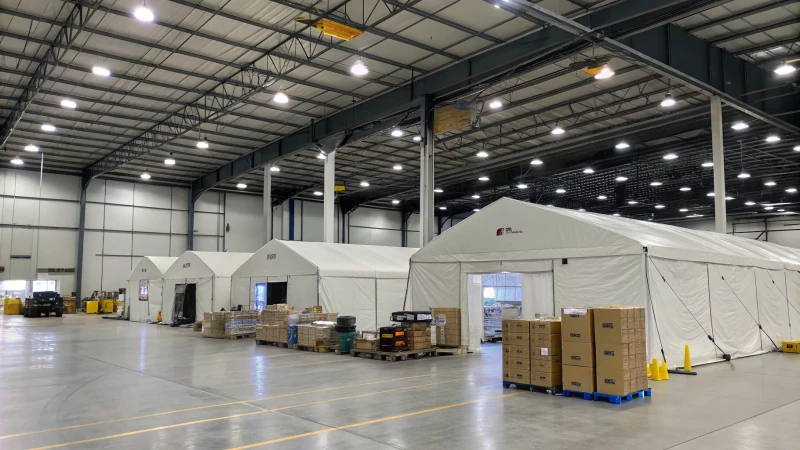
Remember the last time you needed extra storage but couldn’t commit to a full-blown warehouse?
Storage tents offer numerous benefits for warehousing, including cost-effectiveness, quick deployment, and flexibility. These structures are easy to install and can be customized to meet specific storage needs, making them an excellent alternative to traditional warehouses.
It was one of those times when I found myself in desperate need of extra space without the headache of constructing a permanent building. The beauty of storage tents is their versatility—picture setting up a reliable structure almost overnight. They’ve been my go-to solution whenever I need to expand quickly or adapt to shifting inventory demands. From their sturdy frames to weather-resistant canopies, these tents have consistently proven to be lifesavers, especially when agility and cost are key.
Storage tents are more cost-effective than traditional warehouses.True
Storage tents reduce costs by eliminating the need for permanent structures.
Storage tents cannot be customized for specific storage needs.False
Storage tents can be tailored to fit unique requirements, enhancing utility.
How Do Storage Tents Compare to Traditional Warehouses?
I still remember the day I had to choose between a storage tent and a traditional warehouse for my business.
Storage tents are incredibly flexible and cost-effective, offering quick deployment and customizable dimensions. Traditional warehouses, on the other hand, provide permanent storage solutions with higher upfront costs and longer build times. Each has its unique advantages depending on your business needs.
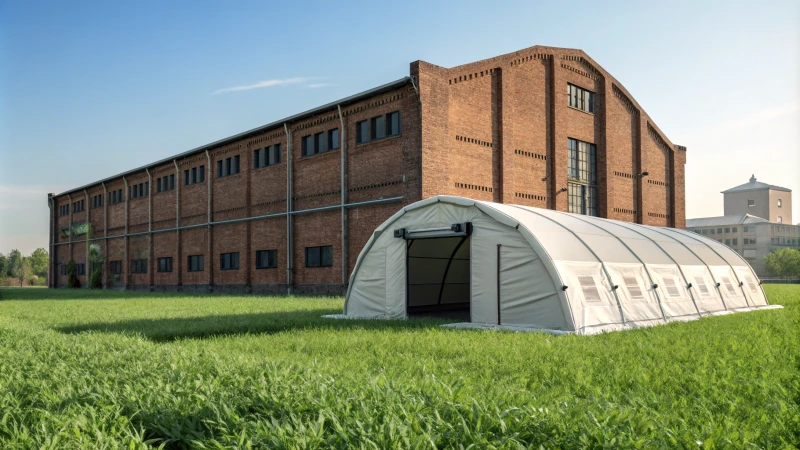
Cost Considerations
When I first started looking into storage solutions, the cost was a big factor. I quickly found that storage tents are generally more cost-effective1 because they require a lower initial investment and have reduced maintenance costs. Plus, setting them up takes fewer resources and less labor, which is a huge bonus.
Traditional warehouses, however, come with significant upfront capital requirements for construction, not to mention ongoing expenses like property taxes and insurance. This made them less appealing for my needs, especially since I was looking for a short-term or flexible solution.
Deployment Speed and Flexibility
One of the things that amazed me about storage tents is their speed of deployment. Their modular design allows them to be assembled quickly—sometimes in just a few days. This was ideal for me because I needed rapid expansion for a project and couldn’t afford to wait months or years.
Conversely, constructing a traditional warehouse is a time-consuming process. Once it’s built, there’s little room for change if your layout needs to adapt, which isn’t great if your business is like mine and requires flexibility.
Environmental Impact
I’m always mindful of environmental impact, and storage tents have the upper hand here. Their lightweight materials mean a lower carbon footprint and less construction waste. They can even be relocated, which saves new land from being developed unnecessarily.
Traditional warehouses are more permanent and can significantly alter landscapes. They demand extensive site preparation and use more resources during construction, which wasn’t what I wanted for my company’s environmental goals.
| Feature | Storage Tents | Traditional Warehouses |
|---|---|---|
| Cost | Lower initial investment | Higher initial cost |
| Deployment | Quick (days) | Slow (months/years) |
| Flexibility | Highly customizable | Limited adaptability |
| Environmental Impact | Lower carbon footprint | Higher due to permanent structure |
Suitability for Various Industries
From what I’ve experienced, storage tents are used across many industries like agriculture, construction, and event management because they’re so versatile. They adapt easily to different storage needs, which is exactly what I needed.
Traditional warehouses, meanwhile, are better suited for industries needing long-term storage or specialized infrastructure. This includes manufacturing2 or logistics companies that require climate control or heavy-duty shelving systems.
Understanding these differences really helped me make an informed decision about my company’s storage infrastructure needs based on our budget, time constraints, and environmental considerations. By weighing these factors, I found a solution that aligned perfectly with our operational goals.
Storage tents have a lower initial cost than warehouses.True
Storage tents require less investment and maintenance, lowering costs.
Traditional warehouses offer more flexibility than storage tents.False
Storage tents are more customizable and adaptable than traditional warehouses.
What Materials Are Used in the Construction of Storage Tents?
Ever wondered what makes storage tents so resilient and adaptable? Let me take you on a journey through the materials that build these versatile structures.
Storage tents are crafted with high-strength aluminum or galvanized steel for frames, and durable PVC-coated polyester for canopies, offering exceptional weather resistance and longevity.
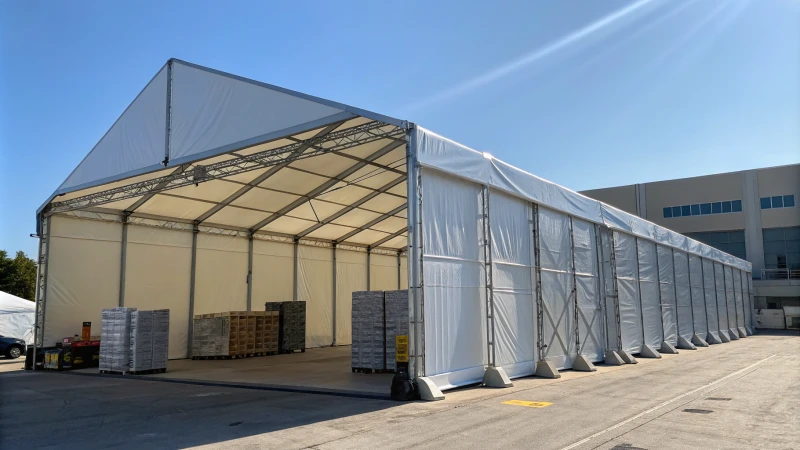
Frame Materials: Strength and Flexibility
I remember the first time I set up a storage tent for a major event. The backbone of any reliable tent lies in its frame, and you can usually choose between high-strength aluminum3 or galvanized steel. Each has its own charm:
- Aluminum: It’s like working with an old friend—lightweight and easygoing. It’s resistant to corrosion, which is a blessing if you’re setting up in a place with unpredictable weather. Plus, it’s easy to customize, making it perfect for those spur-of-the-moment design changes.
- Galvanized Steel: If you need something that feels as solid as a rock, this is your go-to. It’s built to last and can handle just about anything, which is great for long-term projects where you need everything to stay put.
| Material | Key Benefits |
|---|---|
| Aluminum | Corrosion-resistant, lightweight |
| Galvanized Steel | Highly durable, excellent load-bearing |
Canopy Materials: Protection from the Elements
The canopy’s like the cozy blanket that keeps everything safe underneath. Made from double-layered PVC-coated polyester4, it’s packed with features that keep your goods safe:
- Waterproofing: Remember that time it poured during an outdoor event? Thanks to the canopy’s waterproof nature, everything inside stayed dry as a bone.
- UV Resistance: If you’ve ever worried about sun damage, this material’s got you covered—literally. It keeps the sun’s harsh rays at bay.
- Flame Retardancy: Safety’s always first, and this feature means you’re taking every precaution against fire hazards.
The canopy’s robust features make it suitable for a variety of climates and applications.
Additional Considerations: Enhancing Functionality
When you’re picking out materials for your storage tent, think about some extras that can make life easier:
- Insulated Panels: If you’re like me and deal with temperature-sensitive items, insulation is a lifesaver for keeping conditions just right.
- Reinforced Seams: A little extra strength goes a long way in preventing those pesky tears and leaks.
- Modular Design: I love how modular setups let you expand or reconfigure based on what’s needed at the moment—because flexibility is everything.
Routine maintenance is key to keeping your tent in top shape. Regular inspections can help catch wear and tear early, ensuring that your investment continues to serve you well. For tips on keeping your tent pristine, check out these maintenance tips5. Knowing the ins and outs of these materials helps make sure your tent fits perfectly with your business needs and budget.
Aluminum frames are heavier than galvanized steel.False
Aluminum is lightweight, making it lighter than galvanized steel.
PVC-coated polyester canopies are flame retardant.True
PVC-coated polyester is designed to meet safety standards for fire hazards.
How Can Storage Tents Be Customized for Specific Needs?
Ever wondered how storage tents can be molded to fit your unique needs? Let’s dive into the world of customization possibilities!
Storage tents can be tailored by selecting specific frames, fabrics, and features such as ventilation and lighting, catering to various industry-specific storage needs.

Custom Frame Options
When I first ventured into customizing storage tents, I realized that choosing the right frame was like finding the perfect foundation for a house. Just like building a sturdy home, selecting between aluminum alloy6 or galvanized steel frames is crucial. Aluminum’s lightweight nature and corrosion resistance make it perfect for areas with frequent rainfall. I remember a project near the coast where this choice saved us from potential rust issues. On the other hand, galvanized steel provides formidable support, ideal for windier locales—think of it as the tent’s shield against harsh weather.
Fabric Selections
Fabric choice feels akin to picking out clothes that suit the occasion and weather. I once had a client in a fire-prone area who needed extra peace of mind, so we opted for flame-retardant PVC7. This decision wasn’t just about meeting regulations—it was about ensuring safety. For those storing temperature-sensitive items, insulated PVC is like adding a cozy blanket to keep everything at just the right temperature.
| Fabric Type | Features | Ideal Use Cases |
|---|---|---|
| Standard PVC | Waterproof, UV-resistant | General storage |
| Insulated PVC | Additional thermal protection | Temperature-sensitive storage |
| Flame-retardant PVC | Enhanced safety in fire-prone areas | High-risk industrial zones |
Additional Features
The additional features often feel like the cherry on top. When setting up a tent for nighttime operations, integrated lighting transformed it from a basic shelter into a fully functional workspace, no matter the hour. Ventilation systems, another essential add-on, reminded me of the importance of fresh air—not just for people but for stored goods too. Preventing moisture build-up in humid climates is essential for preserving inventory quality.
Modular designs allow for flexibility as needs evolve. Imagine starting with a modest tent and then expanding it as your business grows—it’s like watching your small startup bloom into an enterprise.
Size and Layout Customization
Adjusting the size and layout of storage tents is like fitting together puzzle pieces until they form a perfect picture. This flexibility can be a game-changer for projects with limited space or frequent relocations. I recall a bustling event where we adapted our setup to accommodate last-minute changes without breaking a sweat.
Table: Typical Dimension Customizations
| Aspect | Range (Meters) | Customization Options |
|---|---|---|
| Width | 10 – 30 | Larger spans available |
| Length | Modular 5-meter | Extensions possible |
| Height | 4 – 8 | Adjustments based on design needs |
Conclusion
Understanding these customization options allows businesses to tailor storage solutions precisely to their needs. Whether it’s choosing materials or integrating new features, each decision enhances functionality and efficiency. If you’re keen to explore more about selecting the right tent, resources like industrial tent guides8 are invaluable in making informed choices.
Aluminum alloy frames are heavier than galvanized steel.False
Aluminum is lightweight, while galvanized steel is heavier and offers more support.
PVC-coated polyester fabric is flame-retardant by default.False
Standard PVC-coated polyester is waterproof and UV-resistant; flame retardancy is an enhancement.
Which industries benefit the most from using storage tents?
Who knew a tent could solve so many industry challenges?
Industries like construction, agriculture, and events management reap significant benefits from storage tents due to their adaptability, cost savings, and rapid setup capabilities. These structures offer tailored storage solutions that meet specific industry needs effectively.
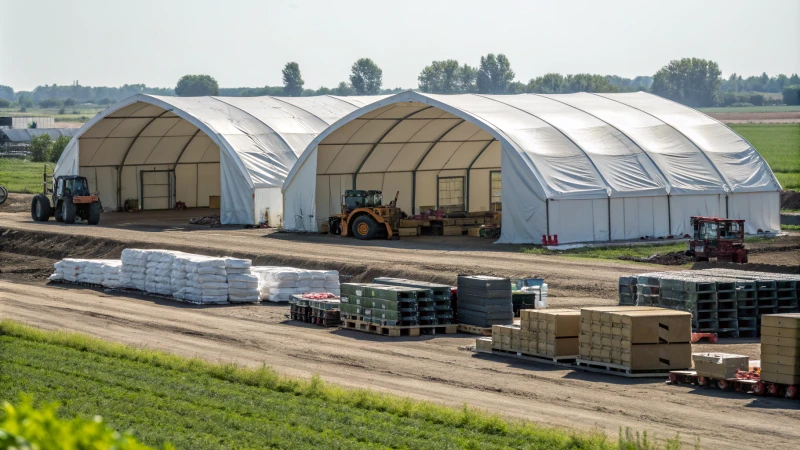
Construction Industry
In my experience working with construction projects, storage tents are a lifesaver. I remember a time when we had to protect some expensive machinery from a sudden downpour. With a quick assembly9 storage tent, we had everything set up in no time, keeping our equipment safe and dry. These tents are not only quick to assemble but also weather-resistant10 enough to withstand harsh weather, which is crucial when timelines are tight.
| Advantages | Details |
|---|---|
| Flexibility | Custom sizes accommodate different site needs. |
| Durability | Strong frames withstand harsh conditions. |
| Portability | Easy relocation across multiple sites. |
Agriculture Sector
Having grown up around farms, I’ve seen firsthand how storage tents can transform agricultural operations. One season, we faced an unexpected harvest surplus. We quickly set up storage tents to keep everything organized and protected, saving us time and money. The cost-effectiveness11 of these tents supports budget-conscious agricultural operations.
Events Management
As an event organizer in my community, I’ve relied on storage tents for everything from small town fairs to large-scale festivals. I recall an event where a sudden storm threatened our equipment; the tents not only provided shelter but also added a touch of elegance to the event.
| Feature | Benefit |
|---|---|
| Rapid Deployment | Quick setup supports tight event schedules. |
| Aesthetic Options | Various designs enhance event ambiance. |
| Space Customization | Adaptable layouts fit diverse event needs. |
Their modular design12 helps us meet various creative needs while keeping everything on schedule.
Manufacturing and Warehousing
In the world of manufacturing and warehousing, space is always at a premium. I remember when we faced a sudden increase in inventory; a storage tent provided the extra room we desperately needed without the hassle of permanent construction.
These examples highlight just how versatile storage tents can be across different industries. Whether it’s protecting construction equipment, managing agricultural harvests, or hosting a memorable event, these tents offer flexible solutions that help businesses run smoothly and efficiently.
By choosing the right storage tent, you can tackle your industry-specific challenges with confidence.
Explore more about how storage tents can benefit your business by understanding custom solutions13 tailored to your industry needs.
Storage tents are crucial for construction timelines.True
Their quick assembly minimizes downtime, crucial for project timelines.
Storage tents are rarely used in agriculture.False
Farmers use them for livestock shelter and crop storage, showing versatility.
Conclusion
Storage tents provide cost-effective, flexible, and quickly deployable solutions for various industries, offering customizable storage options that adapt to specific needs while minimizing environmental impact.
-
Discover how choosing storage tents can save you money compared to building a traditional warehouse. ↩
-
Learn why traditional warehouses might be a better fit for industries with specific infrastructure requirements. ↩
-
Understand why aluminum is preferred for lightweight setups while galvanized steel offers durability for permanent structures. ↩
-
Explore why PVC-coated polyester is ideal for waterproofing and UV protection in storage tent canopies. ↩
-
Learn essential maintenance practices to extend the life and functionality of your storage tent. ↩
-
Learn about the differences between aluminum and steel frames to choose the best option for your environment. ↩
-
Discover how flame-retardant materials can enhance safety and meet industry standards. ↩
-
Explore comprehensive guides on customizing industrial tents to suit various applications. ↩
-
Learn how rapid tent assembly reduces project delays, ensuring timely completion in construction projects. ↩
-
Discover how weather-resistant materials protect valuable construction equipment from the elements. ↩
-
Find out why storage tents offer budget-friendly solutions for agricultural operations. ↩
-
See how modular tent designs facilitate versatile event setups, enhancing event planning. ↩
-
Explore tailored tent solutions that meet specific industry requirements for optimal functionality. ↩


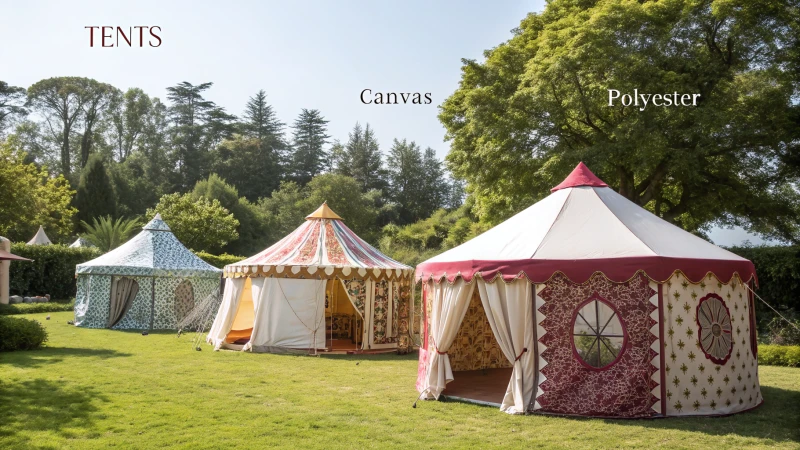


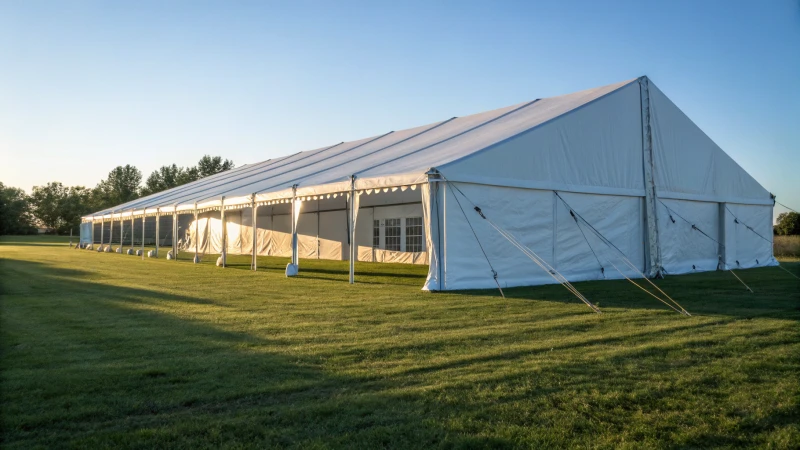


一个回复